You don’t need a business degree to build a successful startup. In fact, most of what they teach in business school could actually slow you down.
I learned this the hard way - and I’ve watched founders lose thousands of dollars – even risk their startup - by missing this critical advice.
So let me show you the early-stage startup advice they don’t teach you in business school. Miss it, and it could wipe your startup completely.
Now, this isn’t theory. I’ve coached over 50 startups and built two of my own. This is the advice I wish I knew before I started.
I learned this the hard way - and I’ve watched founders lose thousands of dollars – even risk their startup - by missing this critical advice.
So let me show you the early-stage startup advice they don’t teach you in business school. Miss it, and it could wipe your startup completely.
Now, this isn’t theory. I’ve coached over 50 startups and built two of my own. This is the advice I wish I knew before I started.
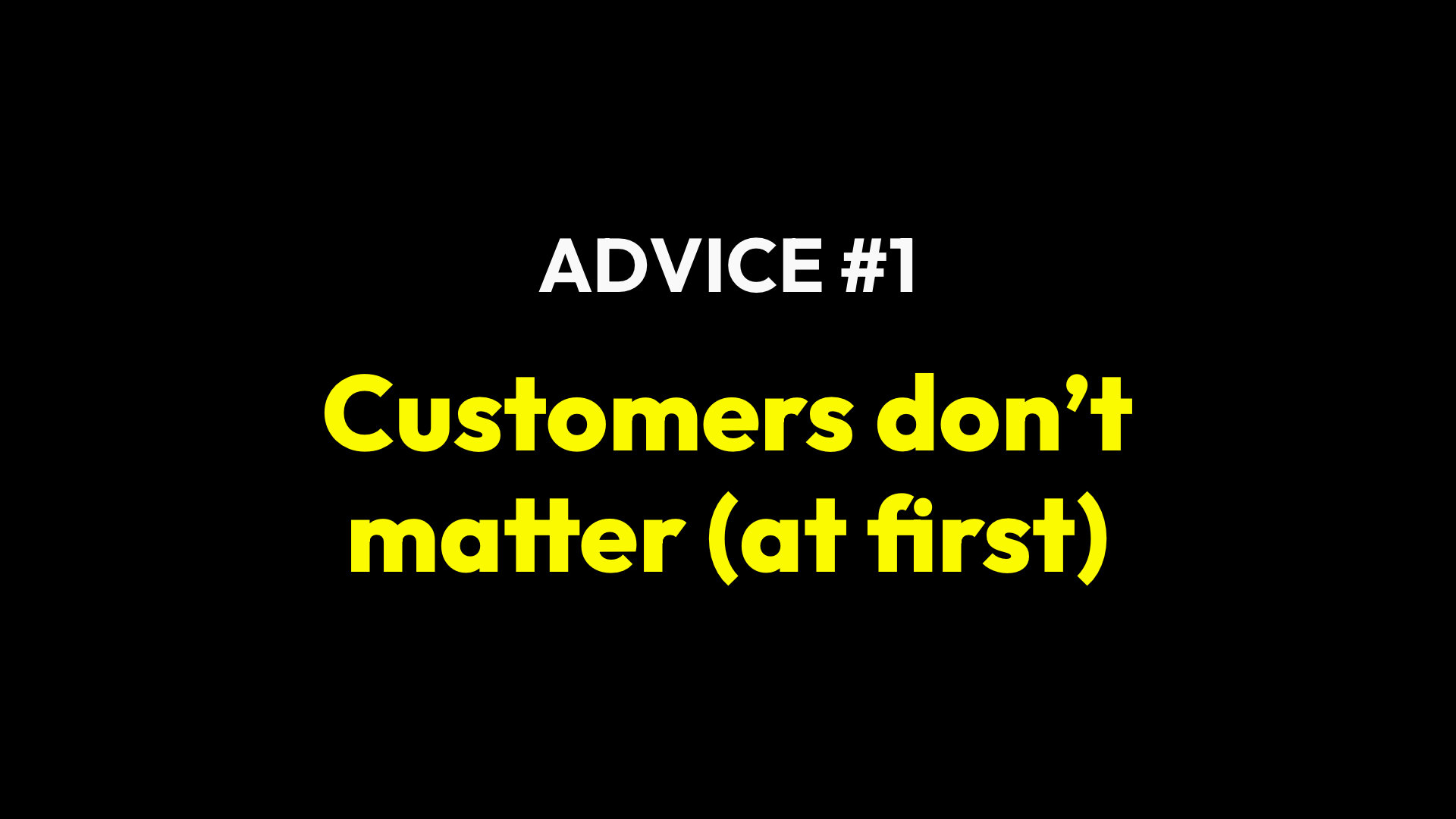
1. Customers don’t matter (at first) — focus on value
You’ve probably heard this a hundred times:
→ Get customers fast
→ Go sell right away
→ Close deals
And that advice sounds right… until you realize it’s a trap.
I’ve seen so many founders spend months chasing signups, cold emailing people, running ads … just to get any customers at all.
But here’s the problem: the product they were selling didn’t actually solve a real pain point. Sure, they got a few customers … but those customers left just as fast. So remember this:
→ Get customers fast
→ Go sell right away
→ Close deals
And that advice sounds right… until you realize it’s a trap.
I’ve seen so many founders spend months chasing signups, cold emailing people, running ads … just to get any customers at all.
But here’s the problem: the product they were selling didn’t actually solve a real pain point. Sure, they got a few customers … but those customers left just as fast. So remember this:
👉 Customers don’t matter at first. What matters is whether you’re delivering real value. Whether you are solving a real problem.
So instead of chasing customer after customer, here’s a better way to spend your time:
Sit down with five customers and ask them:
✅ What do you love about my product?
✅ What don’t you love?
✅ What would you actually miss if it disappeared tomorrow?
And only when you’re sure your product delivers real value - that’s when you start chasing customers. Not before. So here’s my challenge to you:
✏️ Talk to five customers this week. Ask what they love - and what they don’t love about your product. Take notes. This feedback is pure gold.
But here’s the catch: Even if you’re building real value and getting good customer feedback, it’s easy to fool yourself into thinking your startup is growing - just because some numbers are going up.
And that’s where most founders slip up next.
------------------------------------------------------------------------
Before I show you the next key advice and how you can apply it to your startup, let me show you something that will help you on your startup journey - my Startup Success Bundle.
The Startup Success Bundle is perfect for you if you are looking for a step-by-step, actionable roadmap to guide you to startup success.
Click the button below and check it out!
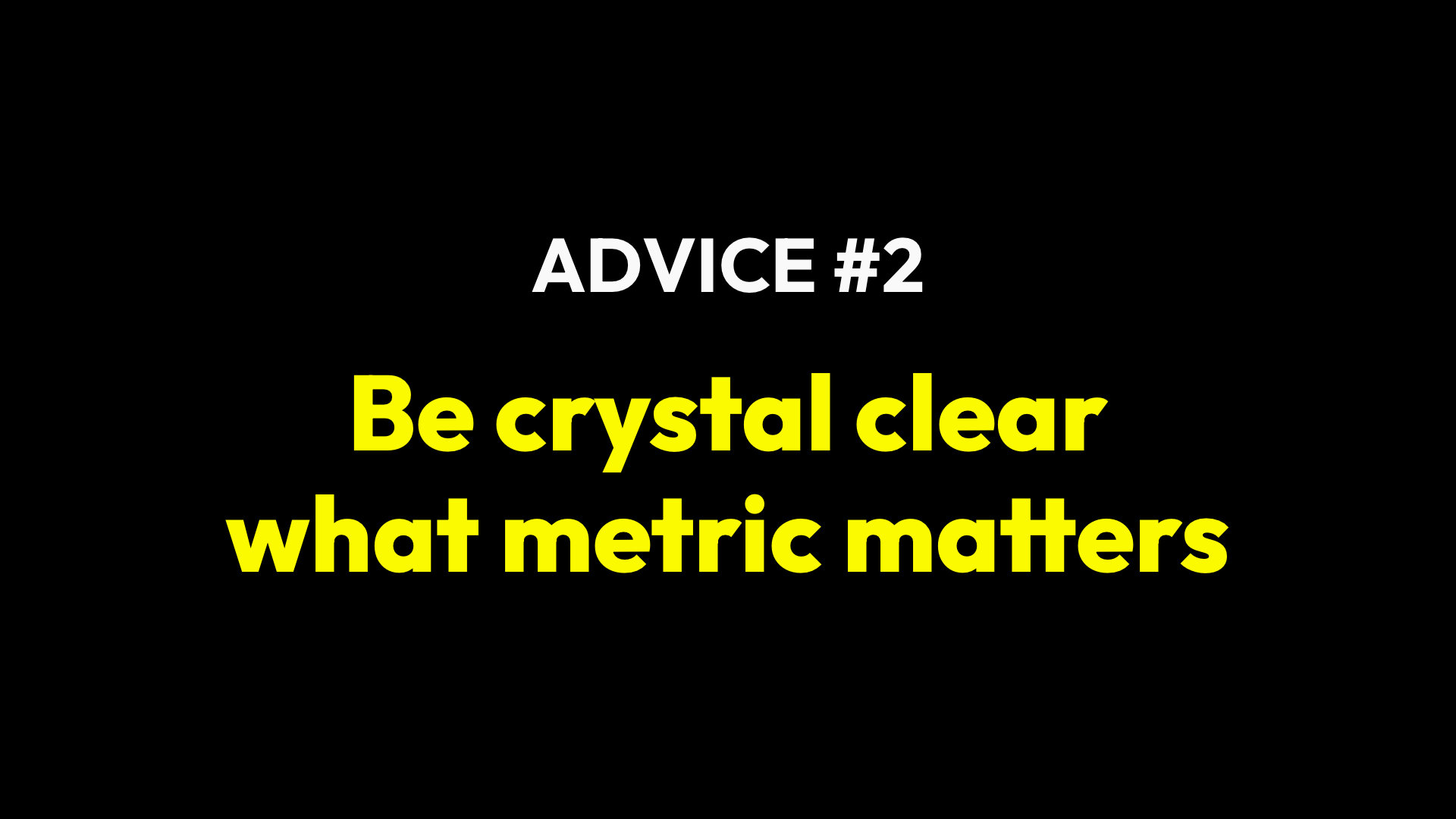
2. Be crystal clear what metric matters to your startup
In the early days of your startup, your dashboard can look like a christmas tree. I've been there.
→ Traffic
→ Likes
→ Demo calls
→ Downloads
All those green charts look amazing, right?
But here’s the catch - most of it is just noise.
And I made this mistake myself – I was tracking everything, and I thought my startup was making good progress. But when I dug deeper, my startup wasn’t growing at all.
Because I was looking at metrics that weren't impacting my startup's success. And that was a tough lesson.
Now, here's what you should do instead.
→ Traffic
→ Likes
→ Demo calls
→ Downloads
All those green charts look amazing, right?
But here’s the catch - most of it is just noise.
And I made this mistake myself – I was tracking everything, and I thought my startup was making good progress. But when I dug deeper, my startup wasn’t growing at all.
Because I was looking at metrics that weren't impacting my startup's success. And that was a tough lesson.
Now, here's what you should do instead.
👉 Pick one North Star Metric. Just one.
That’s the number that really tells you whether your startup is growing and moving in the right direction.
This could be ...
✅ Active users
✅ Retention
✅ Repeat usage
Whatever it is – make sure it's important for your startup.
And sure – you can measure other metrics as well – but remember that this is the most important one – the one that tells you if you are making progress.
So I want you to ask yourself this:
✏️ If you could only measure one thing in your startup, what would it be? What’s your north star metric?
Now, once you know your north star metric, the real question is … how do you actually move it forward? And this is where most founders lose months of progress.
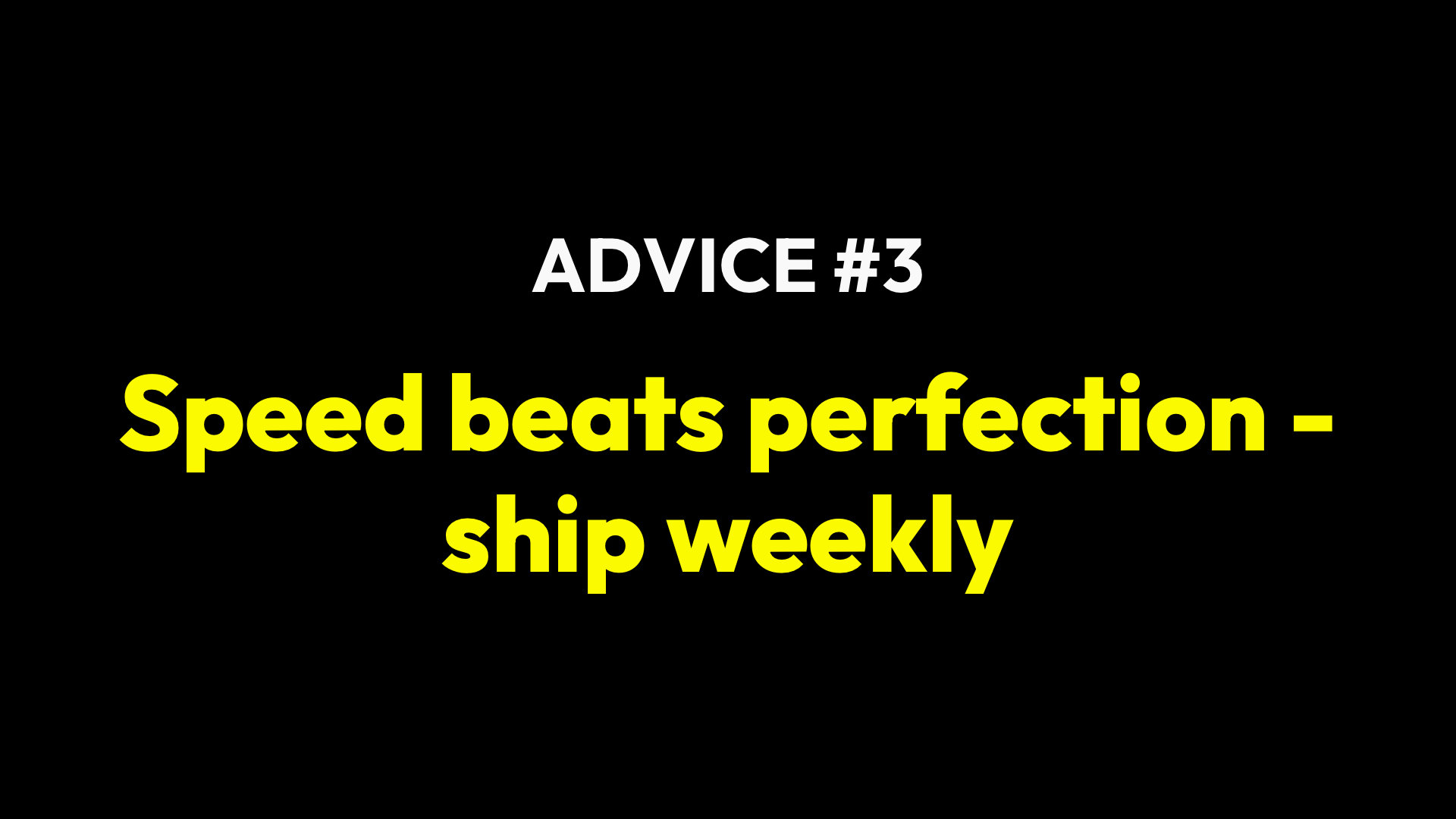
3. Speed beats perfection - ship weekly
I’ll be honest: I’m a perfectionist. And that almost killed my startup.
In the beginning, I wanted everything polished. I wanted the website perfect, the product smooth, the design flawless.
Guess what happened ...
❌ I didn’t launch
❌ I didn't get customers
❌ I didn’t grow
Here’s the truth:
In the beginning, I wanted everything polished. I wanted the website perfect, the product smooth, the design flawless.
Guess what happened ...
❌ I didn’t launch
❌ I didn't get customers
❌ I didn’t grow
Here’s the truth:
👉 Feedback from a rough version of your product is ten times more valuable than a "perfect" product nobody ever uses.
One of my mentors gave me this advice and it changed the way I work in my startup: Ship something every week.
→ Doesn’t matter if it’s tiny
→ Doesn’t matter if it’s rough
→ Ship it anyway
And that mindset shift is a game-changer. Because it builds discipline. It creates momentum. It forces you to learn.
And here is the great thing - those tiny steps add up faster than you think. A scrappy release that teaches you something beats a perfect feature sitting on your laptop any day of the week.
So here’s your action step:
✏️ Ship something this week. Even if it’s tiny. Even if it’s rough. Just break free from the "I need everything perfect" trap.
STARTUP WORKSHEETS, TEMPLATES, CHEAT SHEETS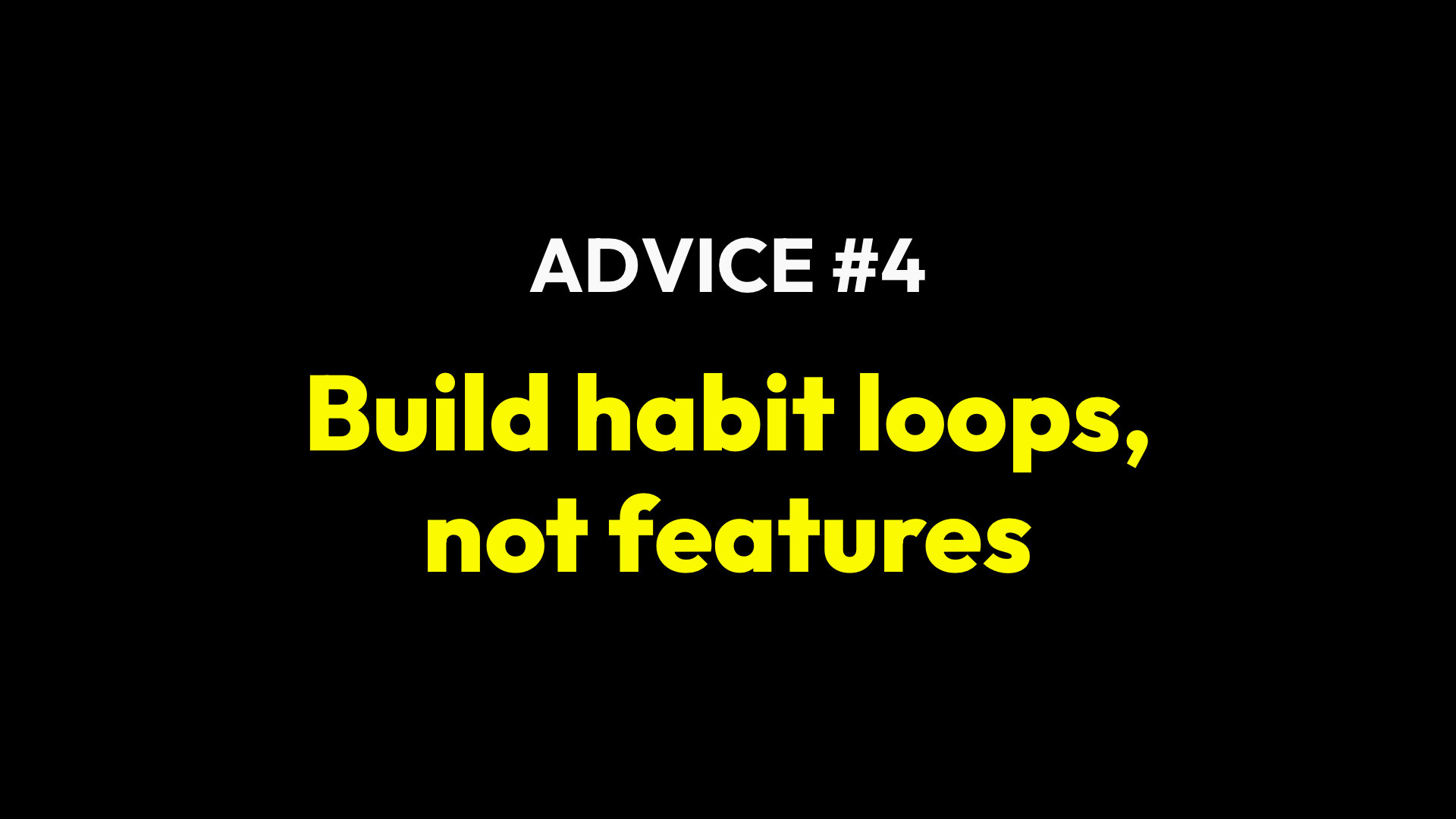
4. Build habit loops, not features - users stick to habits
This is one of the most important lessons I’ve learned as a founder.
Founders often think: "If I add more features, people will stay."
But that’s wrong.
Here is the big learning: Features don’t make people stay. Habits do.
Think about Duolingo for example. People don’t keep coming back because the quizzes are so good. They come back because Duolingo creates a habit loop:
1. It reminds you
2. It gives you a quick task
3. It rewards you
And over time, you build a daily habit.
And that’s why you stick around.
So the real question isn’t:
❌ What new feature should I add?
The real question is:
✅ How do I turn my product into a habit for my users?
If you can make your product part of someone’s daily routine, you’ve won.
If you can’t, no number of extra features will save you.
So here’s something to try:
Founders often think: "If I add more features, people will stay."
But that’s wrong.
Here is the big learning: Features don’t make people stay. Habits do.
Think about Duolingo for example. People don’t keep coming back because the quizzes are so good. They come back because Duolingo creates a habit loop:
1. It reminds you
2. It gives you a quick task
3. It rewards you
And over time, you build a daily habit.
And that’s why you stick around.
So the real question isn’t:
❌ What new feature should I add?
The real question is:
✅ How do I turn my product into a habit for my users?
If you can make your product part of someone’s daily routine, you’ve won.
If you can’t, no number of extra features will save you.
So here’s something to try:
✏️ List one habit your users could build around your product. Like opening your app for a quick quiz and getting a tiny reward each time.
That’s where your growth - and the retention that keeps your startup alive - really comes from.
Now, even if you have a great product, there’s one final piece of advice they don’t teach you in business school - but it’s something I want you to know.
Because it often decides whether your startup survives or fails - and it’s not what most founders think about.
STARTUP WORKSHEETS, TEMPLATES
Now, even if you have a great product, there’s one final piece of advice they don’t teach you in business school - but it’s something I want you to know.
Because it often decides whether your startup survives or fails - and it’s not what most founders think about.
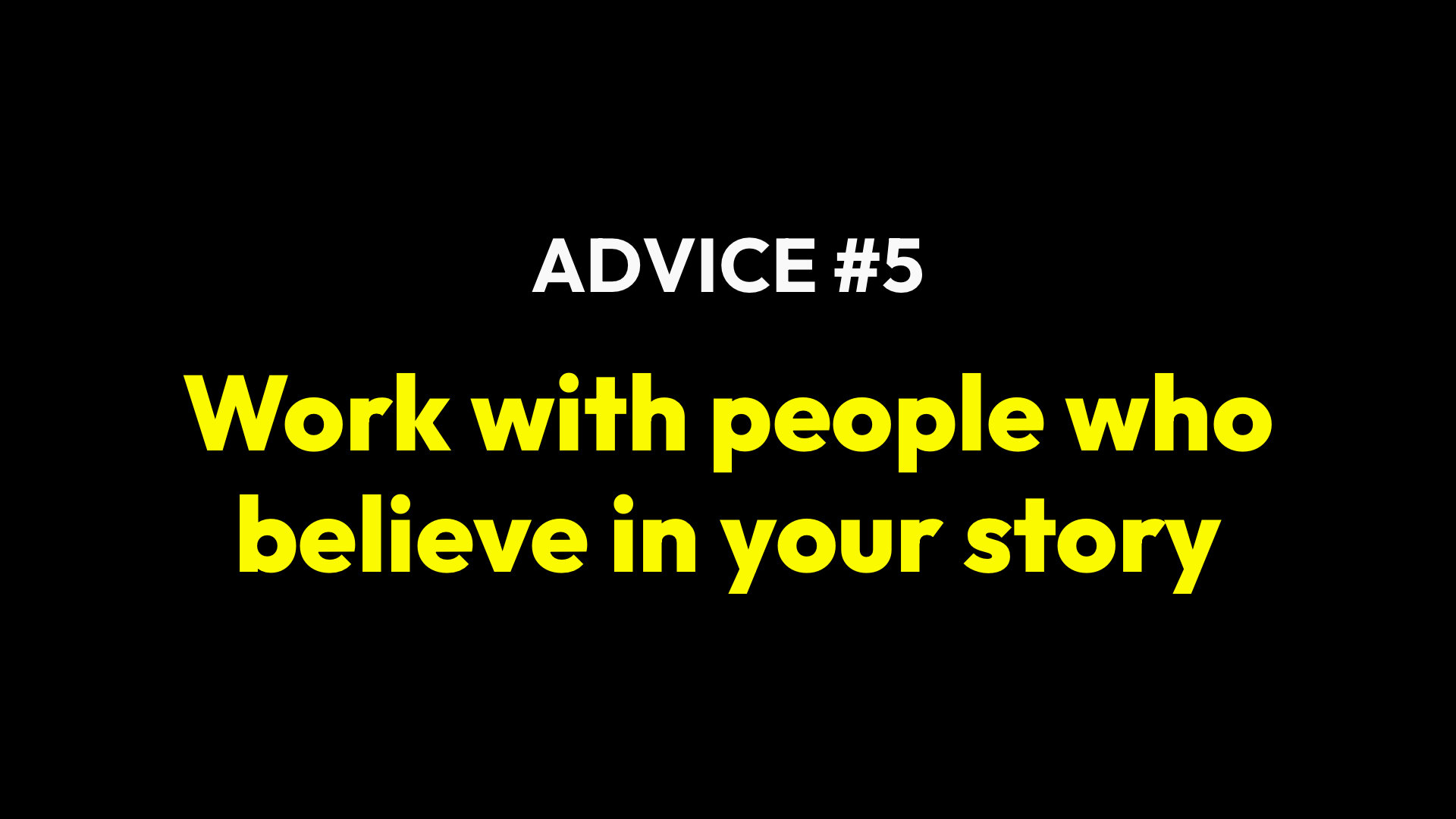
5. Work with people who believe in your story
Startups are fragile. Things will go wrong. You’ll hear no more often than yes. And in those moments, you can’t afford to have people around you who are "just here for the job."
I learned this the hard way. I once kept someone on the team far too long because I thought their motivation might change. It didn’t.
❌ They didn’t give 100%
❌ They didn’t bring ideas
❌ They didn’t care
And the cost was huge.
So here is what I want you to remember:
I learned this the hard way. I once kept someone on the team far too long because I thought their motivation might change. It didn’t.
❌ They didn’t give 100%
❌ They didn’t bring ideas
❌ They didn’t care
And the cost was huge.
So here is what I want you to remember:
👉 When you build your team - belief matters more than perfect skills.
Skills can grow.
Motivation doesn’t.
You need teammates, co-founders, early hires who believe in your story as much as you do. Belief is what gets you through the no’s, the pivots, the setbacks.
And misaligned teammates will slow you down more than a missing skill ever will. So ask yourself this:
✏️ Who on your team loves working with you, brings their own ideas, and is motivated to grow the startup?
Make sure you keep that person close.
They’re worth more than you think.
What's next
So this is the startup advice they don’t teach you in business school. But here’s the thing - this is just the beginning. The real question is: How do you actually build a successful startup?
If you want to grow your startup faster and avoid the mistakes I made, check out my Startup Success Bundle. It's a clear roadmap trusted by 50+ startups.
This system gives you a proven roadmap to help you build your startup faster and with less hassle - so you can gain financial freedom, support your family, and build something you truly believe in - WITHOUT feeling stuck or frustrated.
Check it out now!
If you want to grow your startup faster and avoid the mistakes I made, check out my Startup Success Bundle. It's a clear roadmap trusted by 50+ startups.
This system gives you a proven roadmap to help you build your startup faster and with less hassle - so you can gain financial freedom, support your family, and build something you truly believe in - WITHOUT feeling stuck or frustrated.
Check it out now!

